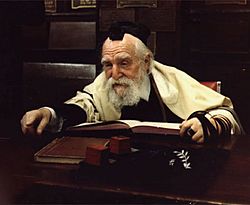Rabbi facts for kids
| Part of a series on | |||
|---|---|---|---|
|
|||
| Judaism | |||
| Category | |||
| Jewish religious movements | |||
| Orthodox (Haredi • Hasidic • Modern) | |||
| Conservative • Reform | |||
| Reconstructionist • Renewal • Humanistic | |||
| Jewish philosophy | |||
| Principles of faith • Kabbalah • Messiah • Ethics | |||
| Chosenness • Names of God • Musar | |||
| Religious texts | |||
| Tanakh (Torah • Nevi'im • Ketuvim) | |||
| Ḥumash • Siddur • Piyutim • Zohar | |||
| Rabbinic literature (Talmud • Midrash • Tosefta) | |||
| Religious Law | |||
| Mishneh Torah • Tur | |||
| Shulchan Aruch • Mishnah Berurah | |||
| Kashrut • Tzniut • Tzedakah • Niddah • Noahide laws | |||
| Holy cities | |||
| Jerusalem • Safed • Hebron • Tiberias | |||
| Important figures | |||
| Abraham • Isaac • Jacob | |||
| Moses • Aaron • David • Solomon | |||
| Sarah • Rebecca • Rachel • Leah | |||
| Rabbinic sages | |||
| Jewish life cycle | |||
| Brit • Pidyon haben • Bar/Bat Mitzvah | |||
| Marriage • Bereavement | |||
| Religious roles | |||
| Rabbi • Rebbe • Posek • Hazzan/Cantor | |||
| Dayan • Rosh yeshiva • Mohel • Kohen/Priest | |||
| Religious buildings & institutions | |||
| Synagogue • Beth midrash • Mikveh | |||
| Sukkah • Chevra kadisha | |||
| Holy Temple / Tabernacle | |||
| Jewish education | |||
| Yeshiva • Kollel • Cheder | |||
| Religious articles | |||
| Sefer Torah • Tallit • Tefillin • Tzitzit • Kippah | |||
| Mezuzah • Hanukiah/Menorah • Shofar | |||
| 4 Species • Kittel • Gartel | |||
| Jewish prayers and services | |||
| Shema • Amidah • Aleinu • Kaddish • Minyan | |||
| Birkat Hamazon • Shehecheyanu • Hallel | |||
| Havdalah • Tachanun • Kol Nidre • Selichot | |||
| Judaism & other religions | |||
| Christianity • Islam • Judeo-Christian | |||
| Abrahamic faiths | |||
| Related topics | |||
| Antisemitism • The Holocaust • Israel • Zionism | |||

Rabbi (in the Hebrew classic רִבִּי ribbi; in the Hebrew modern רַבִּי rabbi) in Judaism signifies "professor, master" or literally "grand". The word "Rabbi" ("My Master") derives from the Hebrew root "Rav", that in the Hebrew biblical signifies "grand" or "distinct" (in knowledge).
In Judaism, "rabbi" is a title of respect for a particularly learned member of a Jewish community. Most rabbis earn their title by studying Jewish law at a seminary or yeshiva. The primary role of a rabbi is to teach Torah. In addition, rabbis often act as the religious leader of a Jewish community. In contrast to many other religions, a rabbi is not required to be present at life cycle events in Judaism. Nevertheless, rabbis still normally preside over life cycle events.
Historically, only men could be rabbis. This is still true in Orthodox Judaism. Most non-Orthodox Jews allow women to be rabbis as well.
Three rabbis together can form a rabbinic court, or beit din. This is done when there is a legal conflict between two Jews. They judge the conflict based on Jewish law. This is also done when somebody wants to convert to Judaism.
Rabbis are also sometimes asked to supervise food preparation to make sure it is kosher. The presence of a rabbi does not make the food kosher or unkosher. It is just supervision. When this is done with packaged food, the packaging is often labeled with a hechsher. A hechsher is a symbol which means that the content of the package is kosher.
Images for kids
See also
 In Spanish: Rabino para niños
In Spanish: Rabino para niños




